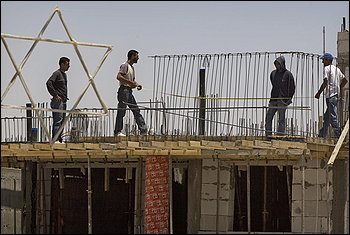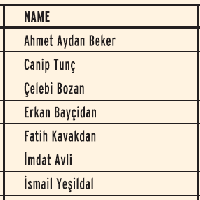![]()
Sat, Nov 20, 2010 | A-Sharq Al-Awsat | By A-Sharq Al-Awsat and Crethi Plethi

Palestinian workers are seen at a construction site of a housing project in the Jewish settlement of Maaleh Adumim, in the West Bank near Jerusalem. (Photo: Sebastian Scheiner/AP; 2009)
Palestinians Continue Building Settlements Despite PA Ban
Palestinian workers continue to build houses in Jewish settlements according to Arabic international newspaper, A-Sharq Al-Awsat, even though the Palestinian Authority passed a law forbidding work in the settlements earlier this year.
“It is immoral for us — totally immoral for us — to work in settlements,” said Economics Minister Hassan Abu Libdeh, who drafted the law which passed in April and bans Palestinians from such work. Earlier in July, Hassan Abu Libdeh expressed his concerns about the ongoing employment of Palestinians in the settlements. “My population, my society, is contributing to the lifeline of the settlements, so I am targeting this contribution,” he said days before Palestinian President Mahmoud Abbas signed the law by the end of July.
Abu Libdeh said the ban — which imposes fines of up to $14,000 and jail time of up to five years for violators — will eventually be enforced. But for now, he said, the government is holding off while it searches for ways to help workers switch jobs.
Palestinians vehemently oppose the settlements Israel has built on land they want for a future state, but about 20,000 to 30,000 Palestinians currently work in the settlements either in construction, agriculture or industry. Palestinian construction workers have been key to building homes for settlers. Many say the West Bank’s poor economy leaves them no choice. Their ability to return to the settlements in recent years — after a period of violence from 2000-2005 which saw the two peoples separated almost completely — has been key to the mini-revival of the Palestinian economy, but it is also helping the settlements prosper and expand.
The PA law also bans the sale of West Bank settlement products in Palestinian shops. Economics Minister Hassan Abu Libdeh estimated the annual sale of settlement goods to Palestinian businesses at between $200 million to $500 million.
Last summer, a public opinion poll showed a majority of Palestinians are opposed to the Palestinian Authority’s decision to ban laborers from working in Jewish settlements in the West Bank. The poll, conducted by the Palestinian Center for Policy and Survey Research, showed that 63 percent of the Palestinians oppose preventing Palestinian laborers from working in settlements although 72% support a boycott of these communities’ products. [Jpost, June 2010]
According to A-Sharq Al-Awsat Palestinian laborers readily admit they are torn between politics and paychecks when asked about the ban at a construction site in Ariel on Wednesday [Nov 10, 2010].
Most work eight-hour shifts five days a week and earn between $35 and $55 per day — which is somewhat less than what Israeli workers would cost, but more than what is generally available to Palestinians in the West Bank. There, similar jobs usually pay $25 per day in the Palestinian cities and $15 in rural areas.
Palestinians have opposed the settlements since Israel captured east Jerusalem, the West Bank and the Gaza Strip from Jordan in the 1967 Mideast war. Supported by most of the world community, they consider the West Bank occupied territory and say moving Israeli civilians there violates international law and is an obstacle to the establishment of a viable and contiguous state. Israel calls it disputed territory and says it can build there until a peace deal is reached.
Palestinian Labor Minister Ahmed Majdalani said that one way the government is trying to combat the phenomenon is the creation of an investment fund aimed at supporting large-scale construction projects and other Palestinian employers. But Palestinian companies will likely continue to pay less than Israeli ones. “We don’t consider the difference in pay a justification for anyone to go work in the settlements — not nationalistically, politically or morally,” Majdalani said.
Settler spokeswoman Aliza Herbst noted that some settlements themselves ban Arab labor, sometimes due to security concerns, but it remains attractively cheap and abundant. She said she supports the Palestinian government’s efforts because she would prefer employers were freed of the financial temptation and hired Jews instead. [A-Sharq Al-Awsat, Nov 11, 2010]



 RSS
RSS

















#Palestinians Continue Building #Settlements Despite #PA Ban | #Israel #Westbank #Peace http://j.mp/d5qhmu
#Palestinians Continue Building #Settlements Despite #PA Ban | #Israel #Westbank #Peace http://j.mp/d5qhmu http://ff.im/u4GKz
RT @CrethiPlethi: #Palestinians Continue Building #Settlements Despite #PA Ban | #Israel #Westbank #Peace http://j.mp/d5qhmu http://ff.i …
RT @CrethiPlethi: #Palestinians Continue Building #Settlements Despite #PA Ban | #Israel #Westbank #Peace http://j.mp/d5qhmu